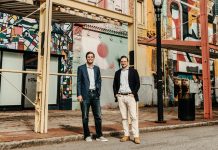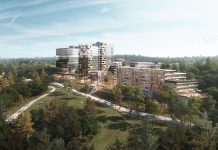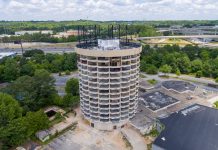
When developers submitted their plans in late 2015 to redevelop Turner Field and the adjacent wasteland of parking lots, one name befuddled observers of the deal: RitaWorld Pearl Kingdom.
Was it a casino? A well-known developer trying to fly under the radar? An off-the-wall venture? Business databases came up empty and real-estate pros didn’t know. Officials from the Atlanta Fulton County Recreation Authority, the government entity that owned Turner Field and was judging bids, were tight-lipped, citing ongoing negotiations.
Now that the deal has been finalized—Georgia State University and Atlanta-based developer Carter plan to turn the area into a mixed-use development that will include housing, retail, and athletic facilities—we can at long last reveal the mystery of RitaWorld Pearl Kingdom and the vision the company had for one of intown Atlanta’s most monumental redevelopment projects.
Who would have thought that a developer would propose replacing a sea of parking with a literal sea?
According to plans submitted to the recreation authority by Okey Isima Jr., who’s listed in the documents as the head of RitaWorld Pearl Kingdom, the company’s vision was one part Sim City, one part Dubai, and one part Robert Moses. And it would have required a lot more property than just the Turner Field site.
The company (which Isima told us has experience working on development projects in Singapore and the Caribbean) wanted to turn the now-vacant baseball field and surrounding acres of asphalt into part of a more than $7.5-plus billion mini-city, built around what Isima said would be the world’s largest lagoon. Kayakers would paddle and swimmers would wade in shipped-in ocean water under the shadows of seven or eight skyscrapers.
Tourists, workers, or residents who lived in one of the 7,000 to 10,000 housing units scattered throughout RitaWorld could shop at one of three retail areas, including an “upscale shopping district near the main tower.” Eight distinct areas—featuring parks, a golf course, a resort, and a collection of “private islands”—would all be connected by cypress tree–lined roads, including streets that cross the lagoon.

The area around the Ted, which would be repurposed and surrounded by mid-rise buildings and a skyscraper, would be called Isima Point. Rita Gardens would include a middle-class gated community of single-family homes and an “intricately designed garden maze park.” RitaLands would feature a mix of affordable, market-rate, and luxury homes; a marina; canals; and the main shopping area, dubbed Rita Pearl. To enjoy the beach and a mix of “coastal Spanish, French, Greek, and Italian architecture,” head to Isima Riviera.
Isima says he started sketching out plans for RitaWorld in 2012. According to him, when the Braves announced they were leaving Turner Field, he thought he had found the perfect location. (Oh, and about that name: Isima’s mother is named Rita, and he credits her with the original vision for the development. He noted that the Spanish meaning of the name “Rita” is “pearl”—as in pearly gates—and the project was meant to create “heaven on Earth.” )
But bringing heaven on Earth to Atlanta would apparently have also meant moving heaven and Earth. To make the vision a reality would have required thousands of workers, incentives, and tax breaks, not to mention buying out—or using eminent domain to acquire—additional property. Though the documents state the plan was subject to change, in renderings the lagoon appears to encompass the entire Peoplestown neighborhood. And Summerhill. And a good chunk of Grant Park. Isima says the company would have offered more than fair-market value for the homes and worked with existing residents to find a new home in RitaWorld.
RitaWorld Pearl Kingdom initially offered $10 million for the megaparcel and Isima, who lives in Atlanta and is the son of the late Nigerian soccer player Okey Isima, says the company received favorable feedback from rec authority officials.
However, Isima thinks that the need to buy out property owners or use eminent domain to gain control of additional land is one reason the plan did not ultimately gain traction. When people speculated about a casino being built on the site, Isima says he kept quiet because he and others signed a non-disclosure agreement. (AFCRA officials did not immediately respond to an email seeking comment.)
Despite the size, scope and cost of the project, Isima is not giving up hope. He says his partners are still on board and the concept could still work—and he wants to build it in the city.
“We still want it in Atlanta,” he says, saying here is where the project makes the most sense. “The inner city has been kind of slow except for the BeltLine. Everything’s been buy-and-flip. No one has done anything major [intown]. We felt like we could take advantage of that, give it a new image for the [21st] century.”
There’s always tomorrow.













